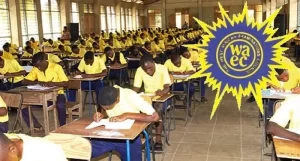
Reactions have continued to trail the recently released 2025 West African Senior School Certificate Examination (WASSCE) results, with stakeholders in the education sector describing the outcome as a national embarrassment and calling for urgent reforms.
Naija News reports that the West African Examinations Council (WAEC) recently admitted to marking errors in the serialised objective questions in the recently released West African Senior School Certificate Examination (WASSCE) 2025 results.
The examination body disclosed this during a briefing with journalists on Friday, August 8.
Speaking with a journalist in Lagos, Head of National Office (Nigeria), Dr Amos Dangut, said with the review, 62.96 per cent of the candidates who sat for the examination had credits and above in a minimum of five subjects, including English Language and Mathematics.
Dangut apologised for technical infractions in the marking of exam scripts.
He identified the error in the previous results of 754,545 candidates, representing 38.32 per cent of candidates, who obtained credits and above in a minimum of five (5) subjects, including English Language and Mathematics.
He added that the reviewed results showed that 1,239,884, representing 62.9 per cent of the candidates, obtained Credits and above in at least five subjects.
Despite this, Naija News reports that this year’s examination results have drawn strong criticism, with parents, teachers and student groups demanding an independent investigation and a shake-up of WAEC’s management team.
Stakeholders argue that subjecting such a critical exam to trial and error is unacceptable.
A school teacher, Divine Mike, described the situation as a national disaster.
“You cannot make such a serious examination a subject of trial and error. Today the pass rate is 38 per cent, tomorrow it becomes 63 per cent. How are we supposed to trust the authenticity of these results?” Mike told Daily Post.
He urged the Federal Government to urgently probe the matter, insisting that WAEC’s leadership must be reshuffled.
NUT, NANS Blame System Failure
The Nigeria Union of Teachers (NUT) said the mass failure was the result of systemic lapses.
“Let us first take a look at the condition under which some of the candidates sat for some of the papers, especially the English Language paper. The Council said it discovered that the paper leaked, and instead of cancelling it, went ahead to let students write it at odd hours,” the union said.
Similarly, the National Association of Nigerian Students (NANS) decried the poor conduct of the exams.
“The condition under which the candidates wrote some papers, especially English, was terrible. Candidates were drained emotionally and tired. The conduct of the exam in some instances left much to be desired,” NANS stated.
Technical Glitches and CBT Concerns
Naija News recalls that WAEC had admitted to technical glitches which forced it to temporarily withdraw access to some results, before apologising and making corrections in English, Mathematics, Biology, and Economics.
A private school teacher, Israel Chukwudi, however, expressed doubts about WAEC’s readiness to transition to Computer-Based Testing (CBT) by 2026.
“If WAEC, as an examination body, could not put its logistics together to ensure smooth running, how would it transit to the Computer-Based Testing it is proposing?” he queried.
Students Shift Focus To NECO
Some affected students told journalists that they had shifted their hopes to the ongoing National Examination Council (NECO) examinations.
A student, Ogwuche Aminu, said: “This has never happened before. Why would an examination body as mighty as WAEC be toiling with innocent children’s future this way? My only hope now is in NECO. I pray I clear the paper to enable me continue my education.”
Another candidate, Blessing Uguru, blamed indiscipline among students for the poor performance.
She said, “Students no longer make time to read any more due to laziness. As for me, I learnt the hard way. I’m waiting for my NECO results to know my fate.”
Reacting to the controversy, the Minister of Education, Dr Maruf Olatunji Alausa, through the ministry’s spokesperson, Boriowo Folasade, reaffirmed the government’s commitment to accountability and excellence.
Alausa noted a consistent decline in examination malpractice rates over the past three years, from 16.29% in 2023 to 9.70% in 2025, attributing it to WAEC’s reforms, including serialisation of question papers in key subjects.
“We are committed to producing smart, competent teachers to better prepare our students for academic success. This is crucial to ensuring that our examinations remain credible and flawless. Let us work together to ensure that every hardworking child has the opportunity to succeed,” the Minister said.
The post Stakeholders Demand WAEC Probe After Controversy On 2025 WASSCE Results appeared first on Naija News.